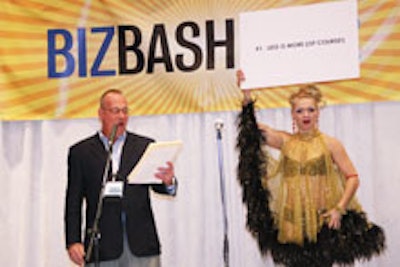
As the city pulls out of its financial slump, many industry leaders at the BizBash New York Expo on Wednesday stressed the importance of rethinking every aspect of event planning. Approximately 3,000 planners, vendors, and executives from the event and meeting industry attended the trade show at the Jacob K. Javits Convention Center, arriving as early as 8 a.m. for a conference program that included 14 panel discussions and educational seminars. With a wide range of topics—from utilizing social media to key trends in catering and entertainment—speakers provided a number of tips for overcoming logistical, financial, and creative challenges. Here's a sample.
1. Now is the time to use your imagination. At his afternoon keynote, David Rockwell, founder and C.E.O. of architectural firm the Rockwell Group, provided insight to the importance of creativity. Rockwell, who designed the set and stage for this year's Academy Awards and published the book Spectacle in November 2006, detailed how he perceives events and design: "All of us have to deal with the fact that we have to make do with less—less money, less resources—and now is the opportunity to use our imagination. I'm excited about the challenge."
2. Don't underestimate social media as a resource for marketing. IML Worldwide's director, Ray Hansen, hosted a morning session dubbed "New Media in Practice: Putting Social Media to Work for Your Events," in which he recited numerous statistics that point to the broad reach and popularity of blogs, Twitter, Facebook, Linked In, YouTube, and Flickr. "Social media has replaced porn as the No. 1 media viewed on the Web," said Hansen, adding that Twitter has grown an astounding 3,712 percent since April.
3. Mistakes happen, but disasters can be avoided. Even the pros encounter the unexpected, which was clear at one panel where planners and vendors shared war stories. But even when things go awry, the best way to avert tragedy is not to label it as an issue. Eileen Solomon, director of special events for Mount Sinai Medical Center, advised that when things do go wrong, avoid using the term "problem," as people are much better at helping out when they think they're rising to an occasion, not fixing a mistake.
4. Look to sponsors for creative design ideas. In the morning keynote presentation with BizBash editor in chief Chad Kaydo, David Stark, president and creative director of David Stark Design and Production, emphasized how a smaller budget doesn't mean an event's design has to suffer. "For me, a challenge is something really wonderful to rise to, and change allows us to come up with the most exciting things possible. With the recent New Yorkers for Children gala, we spent a lot of time talking about what was the right note to take. We were able to make up for a cut budget by bringing in sponsors like Post-It and integrating Post-Its into the decor. These touches are things people will remember."
5. Keep up appearances. Events may not be as lavish as they once were, but, as one panel suggested, you still want your guests to have a good time. "When cutting back on expenses, we didn't want to rob guests of the experience. Perception is reality in a lot of cases. If everyone can see budgets have been cut, it doesn't look good," said Kenny Payne, senior vice president of events and attractions for the National Basketball Association.
6. In entertainment, less can be more. At one of the mini sessions during lunch, Michael Bongar, president of BongarBiz, presented 10 cost-saving ideas for entertainment. First on that list was that sometimes the best entertainment is none at all. "It's better to have fewer really good acts than a bunch of schlock."
7. Even if your catering budget is cut, don't skimp on dessert. Joseph Cozza, president of the New York chapter of the National Association of Catering Executives, moderated a panel on catering trends, where panelists discussed everything from the popularity of celebrity chefs and bar snacks to ideas for morning meeting menus. One tip came from Meredith Barsky, director of catering for Abigail Kirsch's Pier Sixty and the Lighthouse venues: "Desserts are important, because they're often the last memory of an event."
8. There's always room for negotiation. The consensus reached at a discussion called "The Latest Financial Strategies for Planning Events From the Inside Out" was that everything from hotel room rates to fees for audiovisual companies is up for negotiation. "Even with exclusive vendors, there's always room for negotiation. Go in saying 'This is what I have to spend' and put stipulations in the contract. If it's not what you're looking for, go to another venue," said Meryl Hillsberg, event manager for the U.J.A. Federation of New York.
9. Build and maintain relationships with suppliers. However, as much as you need to negotiate with vendors and venues, Hillsberg and her fellow panelists also recognized the need to support suppliers and treat them as partners. "No one wants anyone out of business—then we all lose," said Diane Budion-Devitt, owner and president of the DND Group Inc. "Fair play and maintaining honest relationships are more important now than ever, and we all have to think creatively and strategically as partners while we're getting over this tailspin."
10. When sending out an R.F.P., include a budget. ADM Productions vice president of new business development Dan Held hosted the "Demystifying R.F.I.s, R.F.P.s, and the Proposal to Win Business" discussion, where a number of planners and vendors voiced their concerns with the proposal process. No. 1 on the list of frustrating factors for those who respond to R.F.I.s and R.F.P.s was the lack of budget given. "Usually, if there's no budget attached, we won't respond to an R.F.P.," said panelist Gavin Strumpman, senior vice president of strategic marketing for EventQuest.
11. Don't be afraid to try new things, but know your audience. A poll taken during the "Demystifying R.F.I.s, R.F.P.s, and the Proposal to Win Business" session showed that 38 percent of attendees who respond to R.F.P.s and R.F.I.s believe the client's fear of change is one their greatest obstacles in winning the bid. However, the seminars on catering and entertainment trends warned of taking too much of a risk: "Know what you want and know what you're doing and then work on translating it for your audience," said Bongar. Similarly, "People are looking for recognizable food," said Cheryl Kahn Brocco, the director of catering for the Glazier Group's Bridgewaters, Twenty Four Fifth, and Reach Resort venues.
12. Communicate as much as you can. Across the board, panelists and moderators were quick to point out that communication is key when planning, designing, and producing an event or meeting. "For me, the most important part of an R.F.P. is what the client is asking for between the questions," said Strumpman. Fellow panelist Kevin White, director of production for Empire Force Events, agreed: "The more transparent the R.F.P. sender is, the higher the degree of response there will be."
13. Prove your worth. In a seminar that explored the recent turbulence in the financial meetings industry, all three speakers agreed that successful planners make a case for their jobs by taking ownership of as many projects and plans as possible.
14. Don't do anything without a contract. One topic that came up during the session on financial strategies was the importance of contracts, especially in protecting your organization from unforeseen changes. As a nonprofit event manager, Hillsberg explained how written documents can specify expectations. "Another definition of the N.B.A. is 'nothing but attorneys.' We have intellectual property to protect," said co-panelist Payne.
15. Know your risk. Just as vital as a contract is insurance, something that Bongar recommends never neglecting. "They say the chance of accidents happening are one in a million, but from my 30 years experience, it's less that that."
16. Do your research. The more information you have, the better decisions you make, whether it's negotiating new hotel rates, arguing for this year's budget, or hosting an event in a different country. Payne recounted one instance where he found guests for an event in Phoenix were getting better hotel room rates outside of the block he had reserved. Hillsberg suggested researching how much was spent on a previous event to help determine where to cut and where to splurge.
17. Build a rapport with your team. Sometimes the success of an event or organization can come down to whether the people working on an event are compatible. And for Dayle Russell, senior manager of special events for the Ricoh Americas Corporation, that link can be determined as early as the proposal process. "There has to be that click. If you don't feel chemistry, it's not going to work, especially as you're going to be spending a lot of time working with each other."
18. Rethink existing events and procedures and find ways to streamline. When her team was downsized and cost-cutting measures were implemented, Daniele Menache, managing director of global marketing events for AllianceBernstein, found a creative way to consolidate several events into one. "We started doing back-to-back conferences, where one group would piggyback on another group's meeting. It became one event for multiple groups, and it was so successful. We found that these separate groups were happy with the opportunity to network with each other."
19. Events are about participation. In his presentation on the research done for his book, Rockwell explained what he learned about large-scale events. "These spectacles, like the Holi festival in India, connect, transform, and immerse. They create the ability for human beings to participate in something larger than ourselves. The immersion disconnects you from the normal everyday, whether its sight, smell, or touch."
20. Don't forget to have fun. "Have a great time at your event and your guests will too," suggested Bongar. "You put all your blood, sweat, and tears into planning an event, but for the sake of yourselves and your client or employer, enjoy yourself."



















